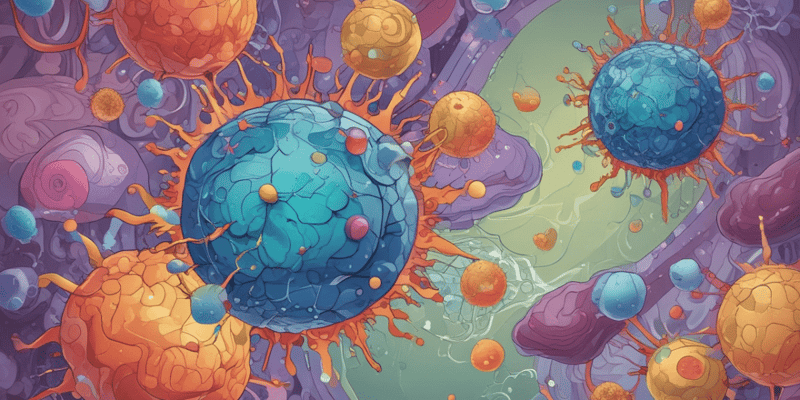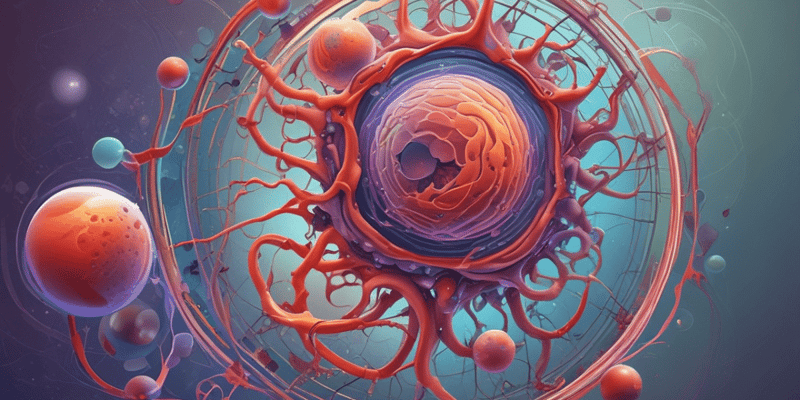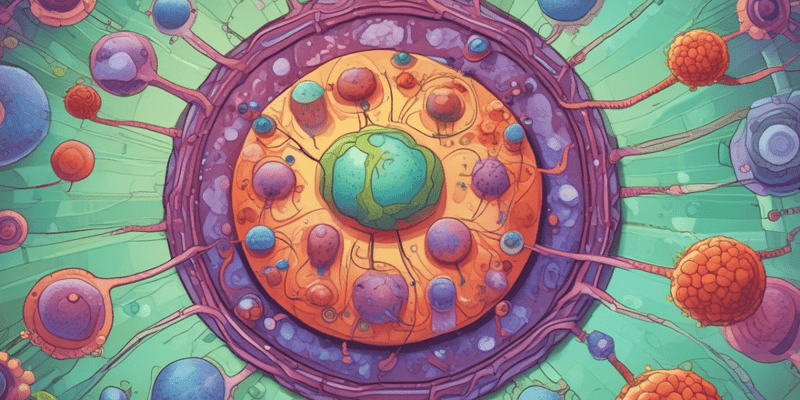Podcast
Questions and Answers
What is the primary function of MHC I in the immune response?
What is the primary function of MHC I in the immune response?
What is the outcome of T cell tolerance?
What is the outcome of T cell tolerance?
Which type of T cell is involved in the activation of B cells?
Which type of T cell is involved in the activation of B cells?
What is the primary function of antigen presenting cells?
What is the primary function of antigen presenting cells?
Signup and view all the answers
What is the outcome of V(D)J recombination?
What is the outcome of V(D)J recombination?
Signup and view all the answers
What is the role of CD4 in the immune response?
What is the role of CD4 in the immune response?
Signup and view all the answers
What is the difference between MHC I and MHC II?
What is the difference between MHC I and MHC II?
Signup and view all the answers
What is the role of T cell receptors in the immune response?
What is the role of T cell receptors in the immune response?
Signup and view all the answers
What is the primary role of the B cell receptor?
What is the primary role of the B cell receptor?
Signup and view all the answers
What is the primary function of opsonins?
What is the primary function of opsonins?
Signup and view all the answers
What is the outcome when a primed T cell encounters a B cell displaying the same antigen?
What is the outcome when a primed T cell encounters a B cell displaying the same antigen?
Signup and view all the answers
What is the primary mechanism of antigen presentation by B cells?
What is the primary mechanism of antigen presentation by B cells?
Signup and view all the answers
What is the role of Fc receptors on phagocytes?
What is the role of Fc receptors on phagocytes?
Signup and view all the answers
What is the outcome when IgG binds to its antigen?
What is the outcome when IgG binds to its antigen?
Signup and view all the answers
What is the primary mechanism of pathogen clearance by phagocytes?
What is the primary mechanism of pathogen clearance by phagocytes?
Signup and view all the answers
What is the role of IL-2 in B cell activation?
What is the role of IL-2 in B cell activation?
Signup and view all the answers
What is the primary function of dendritic cells in the process of adaptive immunity?
What is the primary function of dendritic cells in the process of adaptive immunity?
Signup and view all the answers
Which type of T cell is responsible for producing cytokines that cause proliferation of cytotoxic T cells?
Which type of T cell is responsible for producing cytokines that cause proliferation of cytotoxic T cells?
Signup and view all the answers
What is the primary mechanism by which the immune system determines whether a cell is 'self' or 'non-self'?
What is the primary mechanism by which the immune system determines whether a cell is 'self' or 'non-self'?
Signup and view all the answers
What is the fate of T cells that recognize 'self' antigens during their development in the thymus?
What is the fate of T cells that recognize 'self' antigens during their development in the thymus?
Signup and view all the answers
What is the primary function of B cells in the process of adaptive immunity?
What is the primary function of B cells in the process of adaptive immunity?
Signup and view all the answers
What type of T cell is responsible for recognizing antigens presented on MHC I molecules and killing virus-infected cells directly?
What type of T cell is responsible for recognizing antigens presented on MHC I molecules and killing virus-infected cells directly?
Signup and view all the answers
What is the primary role of MHC II molecules in the process of adaptive immunity?
What is the primary role of MHC II molecules in the process of adaptive immunity?
Signup and view all the answers
What is the fate of B cells that recognize specific antigens during the process of adaptive immunity?
What is the fate of B cells that recognize specific antigens during the process of adaptive immunity?
Signup and view all the answers
Study Notes
T Cell Tolerance and Antigen Presentation
- MHC I interacts with CD8 on cytotoxic T cells, essential for cancer cell detection and clearance, as well as virally infected cells.
- MHC II interacts with CD4 on helper T cells, displaying antigens processed by antigen presenting cells, leading to adaptive immune response.
Antigen Presentation
- Antigen presentation is a two-step process occurring in lymph nodes, with antigen presenting cells presenting antigens to T cells.
- T cell receptors are specific to a single antigen, and B cells only produce specific antibodies to specific antigens.
Antigen Processing Pathways
- V(D)J recombination is a process of gene rearrangement, producing a vast range of unique receptors.
T Cell/B Cell Interaction
- T cells must "help" B cells to effectively respond to antigens, with B cells having receptors specific to a single antigen.
Adaptive Immunity
- Adaptive immunity is the process of eliciting a specific immune response, with T cells and B cells residing in peripheral lymphoid tissue.
- Each T cell has a T cell receptor specific to a single antigen, and each B cell has a B cell receptor specific to a single antigen.
Cells of the Immune System
- Dendritic cells phagocytose invading microorganisms, exhibiting antigen on MHC II molecules, and travel to lymph nodes to interact with T cells.
- T cells proliferate into CD4+ Helper T cells, interacting with B cells, which then mature into plasma cells producing antibodies.
T Cells
- T cells mature in the Thymus, originate from haematopoietic stem cells, and are screened for self-antigen recognition, with those that do undergoing apoptosis.
Major Histocompatibility Complex (MHC)
- MHC proteins exist on the surface of cells, displaying proteins made within the cell, allowing the immune system to determine self or non-self.
B Cells
- B cell receptors are essentially immunoglobulins, with B cells internalizing antigens and presenting them on MHC II.
Immunoglobulins
- Immunoglobulins are proteins produced by B cells, having an affinity for a unique antigen.
Opsonisation
- Opsonisation is the process of labelling pathogens for clearance by phagocytes, with opsonins being molecules that attach to antigens on the surface of pathogens.
IgG and Complement
- IgG can activate the complement pathway once bound to its antigen, with classical, alternative, and lectin pathways.
Clearance of Opsonised Pathogen
- Complement can "punch holes" in the cell membrane of the pathogen, leading to death, and phagocytes internalize the pathogen, producing reactive oxygen species to destroy it.
Studying That Suits You
Use AI to generate personalized quizzes and flashcards to suit your learning preferences.
Related Documents
Description
Learn about the role of MHC I and II in T cell interactions, antigen presentation, and immune tolerance. Understand how MHC molecules interact with CD4 and CD8 on T cells to trigger immune responses.



